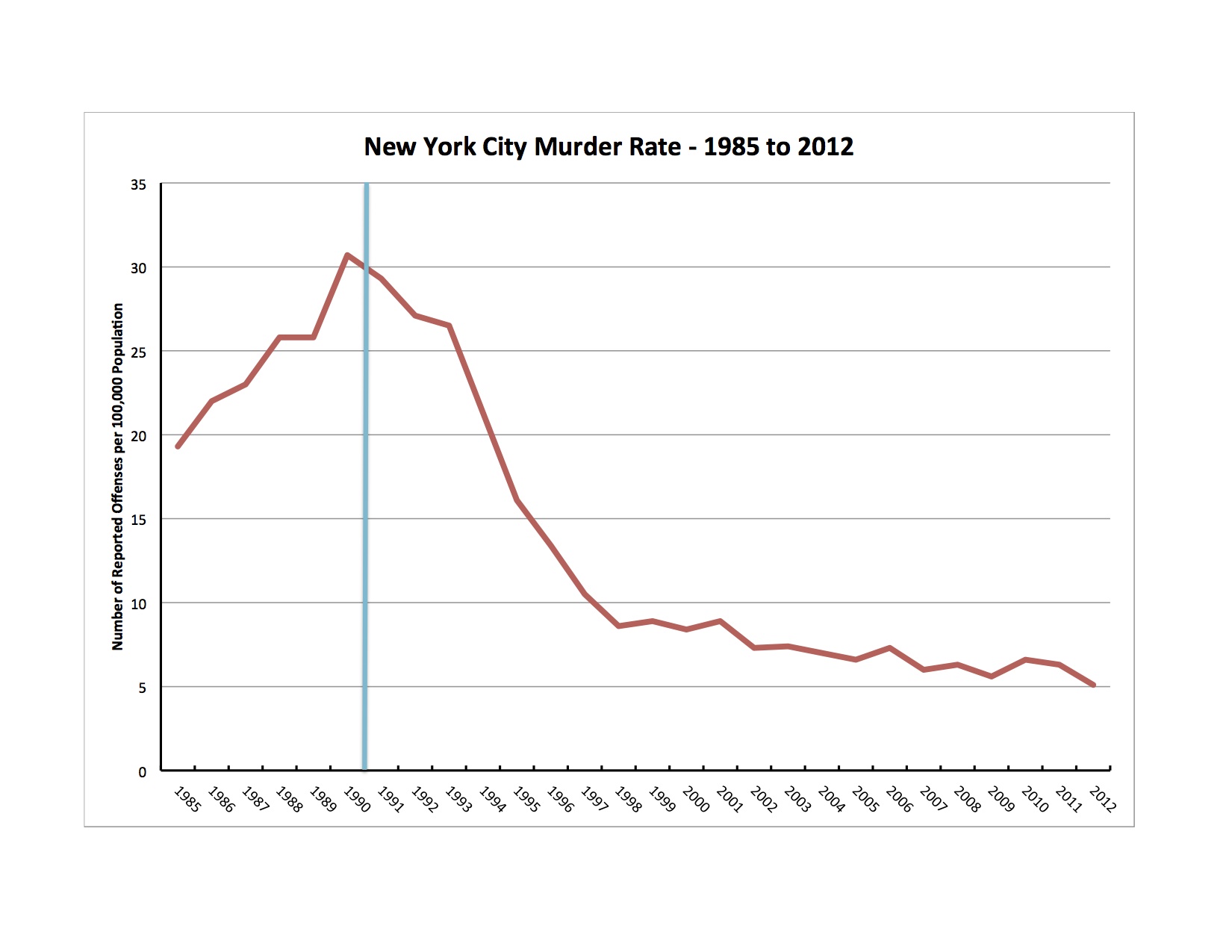The largest city in the US shows that Democratic leadership and strict gun laws will lower your homicide rates
Explain ,Chicago, St. Louis, L.A., Baltimore, New Orleans, Baton Rouge....all democrat controlled for decades, and they all have huge gun murder rates....it is how these cities use their police, how they treat their police, how long they put violent gun offenders in prison, how fast they allow them to be bailed out........it is the culture of the criminal and the criminal justice system, not the law abiding gun owner that drives the gun crime rate.
Democratic Mayor DeBlasio has a lower homicide rate than his Republican predecessors Bloomberg and Giuliani
While that is an interesting metric, as a measure of each man's effectiveness in reducing overall homicide rates, the relevant metric is homicide rate's change during each man's tenure in office.
Consider three mayors each of whom serve (for the sake of easy math) for ten years:
- Mayor "A" entered office with 1000 homicides per year and left with 600 per year. (-40%)
- Mayor "B" entered office with 600 homicides per year and left with 400 per year. (-33%)
- Mayor "C" entered office with 400 homicides per year and left with 300 per year. (-25%)
Given the above fact pattern and attributing the decline in the homicide rate wholly to mayoral efforts (again, for the simplicity of illustrating my point), Mayor "C" does indeed have the lowest homicide rate of the three, but his efforts, holding all other factors steady, are not as effective as were his predecessors'.
While the above illustrates a point, in the "real world" where there are few constants aside from the constitution of the human condition, the reasons Mayor "C" had both the lowest rate of change in the homicide rate and also the lowest quantity of homicides overall. The "law of diminishing returns" itself may provide the answer, but neither must it be the sole contributor to the fact's extancy.
Given the probative insufficiency of raw-count metrics for credibly corroborating a claim about changes in causally multivariate events, it is even more inapt for establishing anything beyond circumstantial correlation between a partisan affiliation and changes in multivariate events having among causes for their fluctuations a leader's political affiliation. To wit, the assertion that "the largest city in the US shows that Democratic leadership and strict gun laws will lower your homicide rates," while it is plausible with regard to strict gun laws, is preposterous with regard to Democratic leadership. [1]
Why did I present the illustration above? Because it goes directly to a tacit theme in post 13. Citing an inapt metric to support a claim is every bit as inadequate (logically, thus argumentatively) as is "overworking" a metric that has some germanity to a matter under consideration.
Note:
- Has someone already established that there is indeed a causal relationship between the party affiliation of a political leader and changes in homicide rates? I don't know, but I know that right now nobody here has cited any sound, thus credible research that indicates there is.
Might one be able to form a sound argument that Democratic leadership is a factor contributing to decreased homicide rates?
Perhaps, but that's a "heavy lift" and one you've not undertaken in even the most cursory of ways. "The most cursory way," as I use that phrase, means presenting all or part of a preliminary outline of an inquiry and corresponding hypothesis that, were one to carry it to fruition (do the research, analyze the data, and complete the essay) as fully developed essay, it'd merit publication in one of the following journals:
- Criminology: Wiley-Blackwell
- Crime and Delinquency: SAGE
- Criminal Justice and Behavior: SAGE
- Sexual Abuse: A Journal of Research and Treatment: SAGE
- Journal of Criminal Law and Criminology: Northwestern University School of Law
- British Journal of Criminology: Oxford University Press
- Journal of Research in Crime and Delinquency: SAGE
- Journal of Quantitative Criminology: Springer
- Punishment & Society: SAGE
- Journal of Interpersonal Violence: SAGE
Aside:
FWIW, while I don't have a problem with strict gun laws, I most certainly have a problem with weak arguments and lamely presented assertions. I have all the more problem with them when they are presented by individuals whose pathos-based stance on a matter seems to align with mine. The last thing any political position needs is weakly forumated arguments and inapt advocacy.
